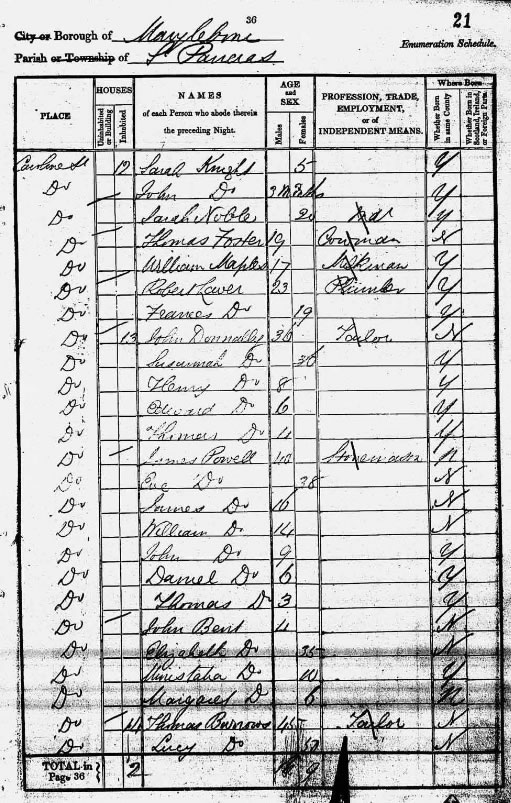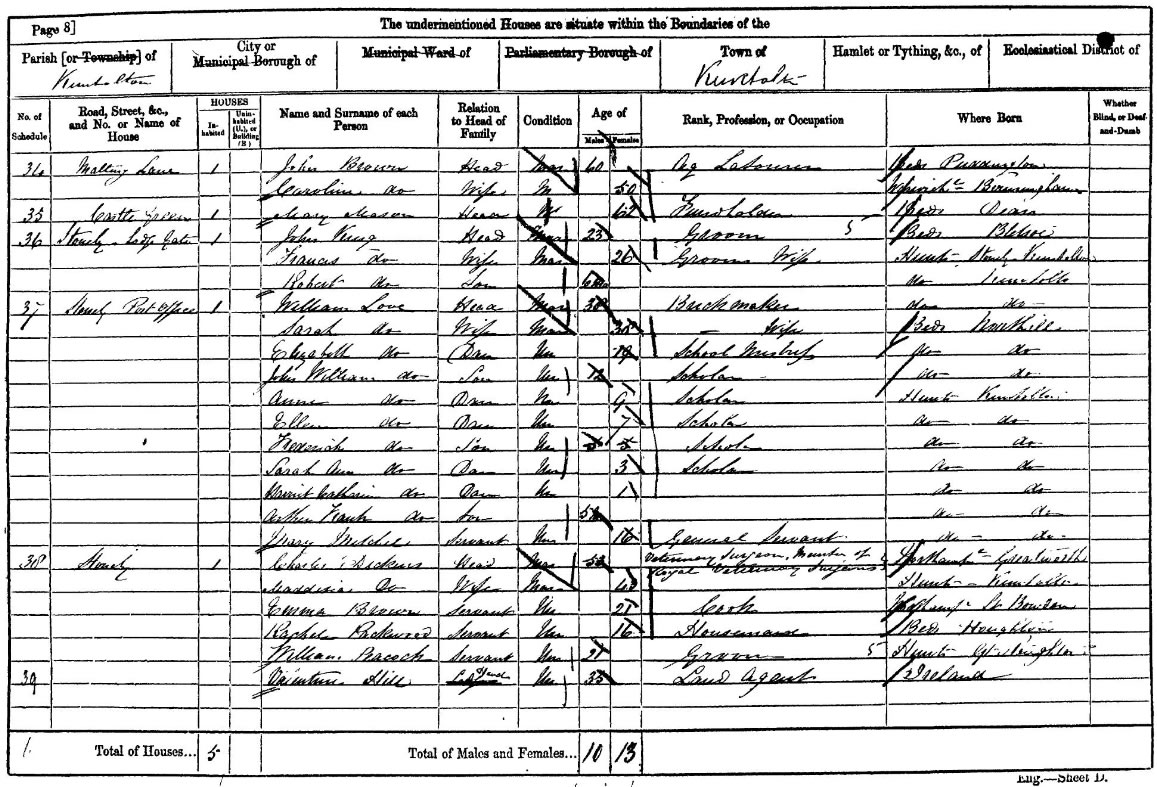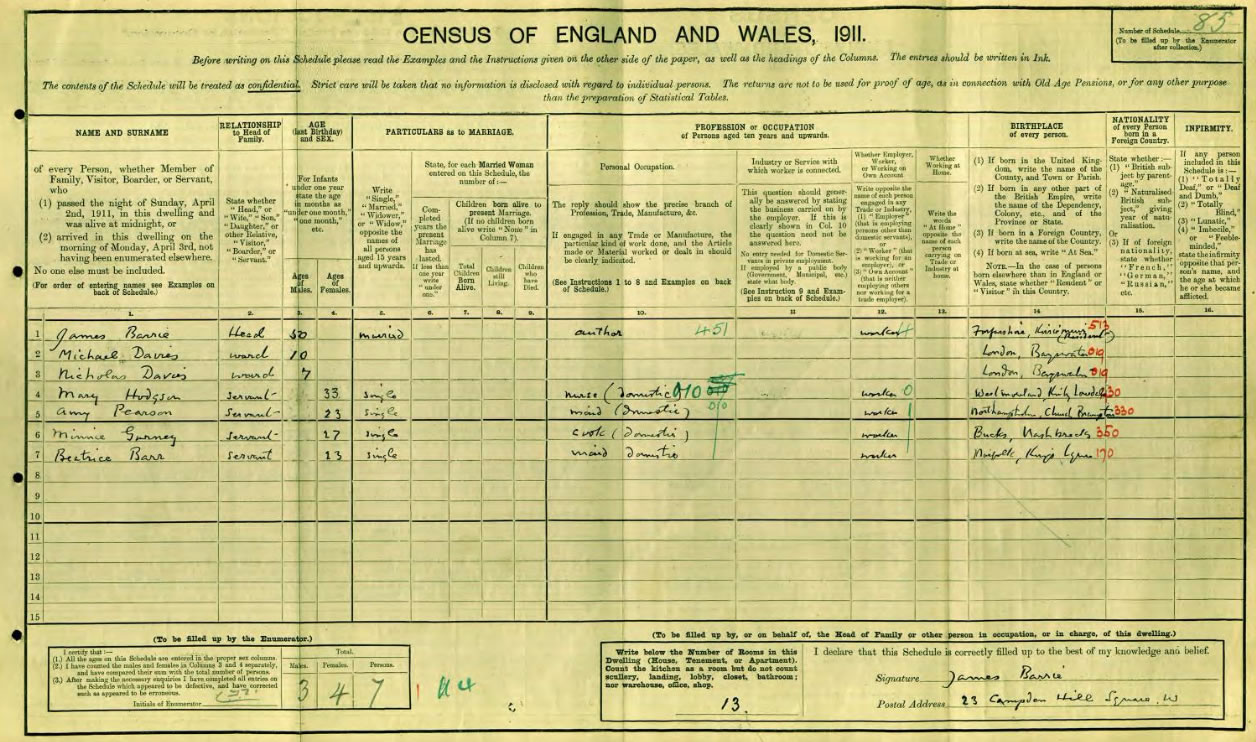Census Records
Census records were created by the government to record statistics about the population from the 19th century onwards at a time when the state was concerned to know if it could sustain feeding its citizens. The U.K. census collections are useful family history records that contain lots of important details about the people of the British Isles on each particular census night, perhaps revealing some interesting facts about your ancestors. Information collected included when and where ancestors were born, their occupation and where they lived. As the decades passed more and more information was collected, with the 1841 census containing pretty sparse data of just people's names, ages, sex, occupation, and if they were born "in county". Children under 15 were to have their age recorded accurately, while those over 15 were to be rounded down to the nearest 5 years so, for example, someone aged 53 should be recorded as aged 50. However, not all enumerators followed this instruction and exact ages may have been recorded. In later years these census records asked for much greater levels of information and so they are one of the most prized of family history record sets.
Once you have located an ancestor you can also find out who else was living at the address, providing you with information on other family members. In-laws and cousins are frequently discovered using census records, so you should have lots of information to help you add to your family tree.The first usable census, from a family historian's point of view, is the 1841 census and currently the most recently published one is the 1911, because they are generally closed for a period of 100 years. A census was taken in the U.K. every ten years, so it may be possible to follow an ancestor born in, or before, the 1841 count all the way through to 1911.
The census was taken across the whole country on a particular night. The records which have been published relate to the occupants of each household on the night given below. Also we list the changes to the information recorded for each of the census:
1841 Census Sunday, 6 JuneRecorded the name, the age (rounded down to the nearest 5 years for those who were over 15, however this instruction was not obeyed in all cases), occupation, whether born in same county noted as a "Yes" or "No" - if it was a no then whether they had been born in Scotland, Ireland or Foreign Parts would be marked with a tick.
1841 Census page |
|
1851 Census Sunday, 30 MarchExtra information asked over the 1841 census was the relation to head of the household, marital status, place of birth, whether blind, deaf or dumb. The rounding down of ages was dropped. |
|
1861 Census Sunday, 7 AprilNo significant changes.
1861 Census page |
|
1871 Census Sunday, 2 AprilA question now asked whether a person was an imbecile, idiot or lunatic. |
|
1881 Census Sunday, 3 AprilNo changes except in Scotland where language spoken was now asked. |
|
1891 Census Sunday, 5 AprilExtra information asked over the 1881 census was whether a person was an employer, an employee, or neither. The number of rooms occupied, if fewer than 5, had to be noted. In Wales a question asked if Welsh, English or both languages were spoken by those in the house. |
|
1901 Census Sunday, 31 MarchExtra information asked over the 1891 census was the number of rooms in the dwelling, as was whether someone was an employer, worker or working on their own account and also whether people were working at home or not. In Wales they were asked what language they spoke – though children under 3 years of age were excluded. The final column added "Feeble-minded" to "Deaf and Dumb, Blind, Lunatic, Imbecile." |
|
1911 Census Sunday, 2 AprilThis was the first UK Census where the census return for a particular household or institution was written directly by the "Head of Household" and was used as the primary census return. A question about the Industry or service, with which the worker is connected was now included. As was one asking how long the couple had been married along with the number of children that had been born alive, how many of these were still alive, and how many had died. A column asked the nationality of any person born in a "Foreign Country". The final column, now became "INFIRMITY: Totally Deaf and Dumb, Totally Blind, Lunatic, Imbecile, Feeble-minded"
1911 Census page |
If you are searching for your British Isles ancestors in this period then these are one of the most fascinating and accessible set of family history records that you can find.
The census collections can be easily searched online below.
©2024 S&N Genealogy Supplies


